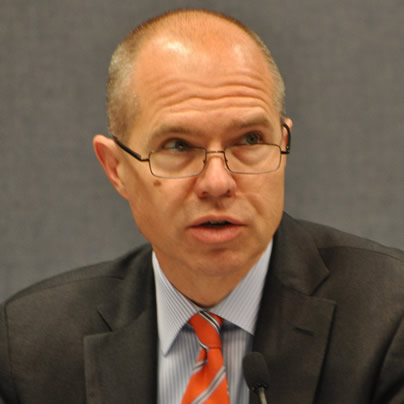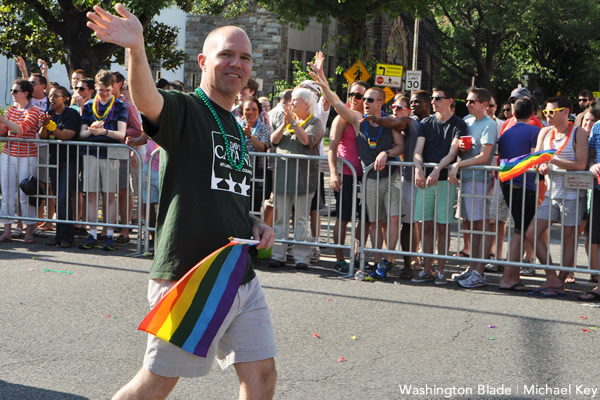Local
David Catania forms mayoral exploratory committee
Five-term Council member could be nation’s capital’s first gay mayor

D.C. Council member David Catania (I-At-Large) filed papers on Wednesday to create an exploratory committee for a possible run for mayor, raising the possibility that he could become the first openly gay mayor of the nation’s capital.
As a 16-year veteran on the Council, Catania has been credited with taking the lead on many far-reaching legislative initiatives; including the city’s same-sex marriage law, the expansion of health insurance coverage to nearly all city residents long before Obamacare, and sweeping reforms at the Department of Health and the AIDS office.
In a letter to city residents posted on his exploratory committee’s newly launched website, Catania said improving the D.C.’s public education system is currently his top priority as a Council member and would be his highest priority as mayor should he choose to enter the already crowded mayoral competition in 2014.
Mayor Vincent Gray and four of Catania’s Council colleagues are among the 11 candidates that have entered the Democratic mayoral primary. A Statehood Green Party candidate and Libertarian Party candidate have also entered the race and are expected to be on the ballot in the November general election along with Catania should he decide to run.
“In 1997, as a political outsider, I ran for the Council of the District of Columbia,” he said in his open letter. “I believed that through hard work and standing up for what’s right, I could contribute to a brighter future for our city and its residents. Since then, we have made incredible progress as a city, and I am proud to have played a part in it,” he said.
Catania won his first race for the Council in 1997 as a Republican running in special election to fill a vacant at-large seat. He won re-election the following year followed by election wins in 2002, 2006, and 2010.
In 2004, Catania withdrew from the Republican Party in response to the support by then-President George W. Bush and the Republican Party leadership of a constitutional amendment to ban same-sex marriage. He has remained an independent since that time.
Should he decide to run for mayor next year he would have to give up his Council seat since that seat is also up for election in 2014. But as an independent, Catania would have the advantage of knowing who wins the Democratic primary scheduled for April 1 before the deadline for filing as an independent mayoral candidate in June.
And if he chooses to run, he would be considered a significant challenger to the Democratic nominee in a city where the mayoral contest has almost always been effectively decided in the Democratic primary. No non-Democratic candidate has ever won election as mayor since D.C.’s first home rule election for mayor in 1974.
Although Catania has wide name recognition and has won a citywide election for the Council six times, he has always competed for one of the two at-large seats up for grabs every two years that by law must go to a non-majority party or independent candidate. While Catania has won his races by large margins he – along with all other non-Democrats competing for the non-Democratic seat – has received about half the votes that the Democratic candidate running for the other at-large seat.
Political observers say the drop off in the vote for the non-Democrat may be due more to the fact that many voters don’t realize they can vote for two candidates rather than one in the at-large race, with the top two vote-getters winning the seat. Even with the so called “drop-off” vote, Catania has always received strong support from Democratic voters, a factor that could make him competitive against a Democratic mayoral candidate.
Catania said in a telephone interview on Wednesday the fact that the Blade was the only news media outlet so far to ask him about his sexual orientation out of more than a dozen interviews throughout the day was indicative of the “extraordinary progress” the city has made on LGBT equality.
“16 years ago when I was first elected to the Council in every sentence in every report, every story that came out in the weeks following my election there was always a comma – openly gay,” he said. “It was a label that no matter what I was talking about it always included my sexual orientation. And 16 years later we don’t see that anymore.”
Catania said he had no objections to being labeled as openly gay then or now. But he said the apparent disinterest in his sexual orientation as he launches a mayoral exploratory committee this week shows that the city has progressed to a point where someone’s sexual orientation is no longer a big deal.
“I think it underestimates the independence of all of our voters to suggest that they will vote for someone simply by virtue of their sexual orientation, or their gender or their color or geography,” Catania said. “I think we are entering an era where people no longer feel that they have to or are inclined to support a person who may demographically be similar to them.”
He added, “We have a smart and sophisticated electorate that will make a decision based on who they believe best represents their value system and that they trust. And in that debate I think I’m going to do well across all demographics.”
Catania said he’s optimistic that if he decides to run his record as a Council member and a concerned city resident will likely be how he will be judged.
“I’m very proud of what I feel I’ve contributed to over these last 16 years,” he said. “The renaissance of the city and particular initiatives I’m proud of includes things like marriage equality, smoke-free D.C. I’m proud of offering the medical marijuana initiative. I’m proud of the work I did to bring health insurance to 40,000 people. I’m proud of the work I did on HIV/AIDS and on so many other subjects.
“But an enduring challenge remains, and that is the quality and the state of our public education system,” Catania added. “And that is the singular focus of this exploration at this point. How to set our kids up to succeed. We are never going to tackle the income inequality in this city if we continue to do things as we have done them. And at the moment, while our schools are showing a modest improvement, that improvement is uneven and is leaving vast portions of our city behind because we do not have excellence in every school for every child. We do not. And until we make it a top priority of this city we are not going to be the city that we can be.”
Virginia
Walkinshaw wins Democratic primary in Va. 11th Congressional District
Special election winner will succeed Gerry Connolly

On Saturday, Fairfax County Supervisor James Walkinshaw won the Democratic primary for the special election that will determine who will represent Virginia’s 11th Congressional District.
The special election is being held following the death of the late Congressman Gerry Connolly, who represented the district from 2008 until 2024, when he announced his retirement, and subsequently passed away from cancer in May.
Walkinshaw is not unknown to Virginia’s 11th District — he has served on the Fairfax County Board of Supervisors since 2020 and had served as Connolly’s chief of staff from 2009 to 2019. Before he passed away, Connolly had endorsed Walkinshaw to take his place, claiming that choosing Walkinshaw to be his chief of staff was “one of the best decisions I ever made.”
The Democratic nominee has run his campaign on mitigating Trump’s “dangerous” agenda of dismantling the federal bureaucracy, which in the district is a major issue as many of the district’s residents are federal employees and contractors.
“I’m honored and humbled to have earned the Democratic nomination for the district I’ve spent my career serving,” Walkinshaw said on X. “This victory was powered by neighbors, volunteers, and supporters who believe in protecting our democracy, defending our freedoms, and delivering for working families.”
In addition to protecting federal workers, Walkinshaw has a long list of progressive priorities — some of which include creating affordable housing, reducing gun violence, expanding immigrant protections, and “advancing equality for all” by adding sexual orientation and gender identity to the Fair Housing Act.
Various democratic PACs contributed more than $2 million to Walkinshaw’s ad campaigns, much of which touted his connection to Connolly.
Walkinshaw will face Republican Stewart Whitson in the special election in September, where he is the likely favorite to win.
Maryland
LGBTQ suicide prevention hotline option is going away. Here’s where else to go in Md.
Changes will take effect July 17

By ANNA RUBENSTEIN | The national suicide prevention hotline will no longer offer specialized support to LGBTQ people, starting July 17, the Trump administration announced last week.
Dialing the hotline at 988 will still be available for crisis support. But callers will no longer be able to reach specific LGBTQ services by pressing Option 3. The change worries advocates because their data shows the LGBTQ community has a disproportionally high suicide rate.
Even after the option ends, here’s how to receive tailored support if you’re in Maryland.
The rest of this article can be found on the Baltimore Banner’s website.
Maryland
Silver Spring holds annual Pride In The Plaza
‘Today means inclusion. It means to build resilience’

Silver Spring’s annual Pride in the Plaza event took place on Sunday to celebrate the LGBTQ community and emphasize inclusion and resilience.
“Today means inclusion. It means to build resilience, love,” Robyn Woods, program and outreach director for Live In Your Truth, which organized the event, said. “I mean, just being surrounded by the community and so many great entrepreneurs, business owners, and just being a part of this whole rainbow coalition that we call the LGBTQIA to be about.”
With the event being her first time organizing for Live In Your Truth, Woods said she felt emotional to see the support and love at the event.
“Some people (are) bringing out their children, their babies, their grandparents,” Woods said. “It’s a lot more allies here than anything else. That type of support to me means so much more than just support from my community; just outside support, inside support, so much support around it, so much love. Everyone’s smiling outside, helping each other.”
Attendees of the event were able to head over to the Family Fun Zone, an air-conditioned Pride Cool Down Lounge, or watch live drag performances in the main stage area.
Along with entertainment and a shaved-ice stand, rows of information tables stood along the plaza, including FreeState Justice, the Washington Spirit, Trans Maryland, Moco Pride Center, and the Heartwood Program, an organization that offers support, therapy, education, and resources to the LGBTQ community.
“I want people to know about our services, and I love what we have to offer,” Jessica Simon, psychotherapist for Heartwood Program’s Gender Wellness Clinic, said. “I (also) want to be part of a celebration with the community, and so it feels good to be here with other people who have something they want to give to the community.”
She added that within today’s political climate, to which she called an “antidote to shame,” it’s important to be celebrating Pride.
“There’s a lot of demonization of LGBTQI people,” Siena Iacuvazzi, facilitator for Maryland Trans Unity, said. “(Pride) is part of the healing process.”
Iacuvazzi said she was taught to be ashamed of who she was growing up, but being a part of a community helped her flourish in the future.
“I was taught how to hate myself. I was taught that I was an abomination to God,” she said. “But being a community is like understanding that there are people who have experienced the same thing, and they’re flourishing. They’re flourishing because they’re willing to stand up for themselves as human beings and discover themselves and understand what’s true for themselves.”
She added that Pride allows for a mutual understanding to take place.
“It’s more of a sense of belonging … and just taking that home and understanding you’re not alone,” Iacuvazzi said. “We’re each taking our own journey — we’re not putting that on each other. It’s just walking away with a sense of belonging and humanity.”
Similar to Iacuvazzi, Woods said she hopes attendees’ biggest takeaways would be family, fun, resilience, and pride.
“Being proud of yourself, being happy for who you are, and representation and how much it matters,” she continued. “And I think all these young people that are walking around here get to see versions of themselves, but older. They get to see so many different lesbian, gay, bisexual, pansexual people that are successful, that are showing love, that care, and it’s not how we’re portrayed in the media. It’s lovely to see it out here. (It’s) like we’re one big old, happy family.”
-

 U.S. Supreme Court4 days ago
U.S. Supreme Court4 days agoSupreme Court upholds ACA rule that makes PrEP, other preventative care free
-

 U.S. Supreme Court4 days ago
U.S. Supreme Court4 days agoSupreme Court rules parents must have option to opt children out of LGBTQ-specific lessons
-

 Television4 days ago
Television4 days ago‘White Lotus,’ ‘Severance,’ ‘Andor’ lead Dorian TV Awards noms
-

 Music & Concerts5 days ago
Music & Concerts5 days agoBerkshire Choral to commemorate Matthew Shepard’s life













